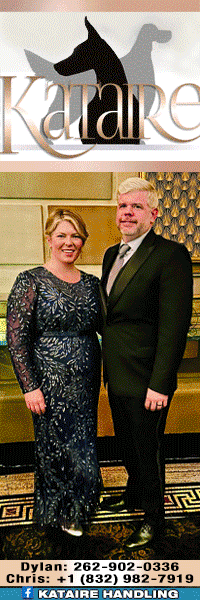Subjectiveness Revisited by Dr. Gareth Morgan-Jones
by Dr. Gareth Morgan-Jones
As I was in the process of choosing the subject and title for this month’s essay my good friend and fellow judge, Howard Yost, readily came to mind. I could just hear him say: ‘oh no, not again’. A somewhat reluctant connoisseur of big words though he may be (he particularly likes ‘polymorphism’) he might well balk at yet another cumbersome heading and a return visit to something already considered by me on more than one occasion. But the whole matter of subjectivity, as it impacts the sport of purebred dogs, an area of interest which I have deliberated upon previously, is surely worth another article. Some things, after all, deserve to be repeated. Whenever I come back to a subject dealt with before, a novel approach is attempted, for it is always useful to look at things from a slightly different perspective, from another angle so to speak. And so it is on this occasion. In evaluating respective merits of exhibits in conformation competition what role do factors peculiar to particular individuals, as dictated by personal views, depth of knowledge, experience or background, play in decision-making? How is ability to perceive reality conditioned by individual mental characteristics where such things as instinct, intuition, imagination, interpretation, sensitivity and taste, come into play? What relevance does the doctrine that personal feeling is the ultimate criterion for reaching that, which is right, have? How do the objective and subjective dimensions interact, how can one differentiate between incompetence and that which is legitimately based on valid differences of opinion? Where does the one start and the other end? How can one determine if an appraisal formed in the mind constitutes an expert, authoritative, cogent evaluation or is just a superficial, cursory, subjectively reached judgment that is of doubtful value?
It has often been said that during the process of judging purebred dogs a whole lot of subjectivity usually and inevitably comes into play and that this oftentimes has a significant impact on decision-making. There is, of course, more than an element of truth to this notion. But what exactly do we mean by this and to what degree or extent does it take place? How readily, or otherwise, can this be determined? Given that it presumably occurs with some regularity, what level is acceptable? And is there another side to this proverbial coin? When we suggest that someone’s judging is highly subjective, and thereby suspect, what exactly are we talking about? Is this something that we, on occasion, casually toss about because of some dissatisfaction or other and is frequently offered as an explanation for a particularly disliked or disapproved decision? How soundly based is this sort of thing? Can we be certain of our grounds in this regard or is this just one of those frequently encountered intangibles, one of those things that are not significantly real, which is purely speculative in nature? Is this something that is capable of being accurately perceived? It can, of course, be readily argued that it is relatively easy to determine if someone or other is allowing personal preferences, predilections and prepossessions to directly influence decision making. This implies the practice of a strong liking derived from appreciation or inclination and it may even suggest a fixed conception, which, in the final analysis, is likely to preclude a good measure of objectivity. So how should one view this phenomenon? With some tolerance and understanding, or otherwise? Is there even a positive side to this sort of thing?
The central question in all this goes something as follows: how much room is there when judging dogs for the exercise of personal feelings, preferences, and varying interpretations of breed standards? What latitude should there be for such indulgence? It has often been said that judging pedigreed dogs well requires a certain flair, a certain skill or instinctive ability to appreciate quality when it is encountered. This is where the having-an-eye proficiency surely kicks in. There is an art to this, acquired by experience, study and observation, coupled with a measure of creative imagination. Well, perhaps imagination is not quite the right word to use here but there exists a particular dimension which involves such things as consideration of aesthetic appeal and visual attractiveness. In this there are inevitably going to be some variables and not everyone necessarily sees or senses things the same way or to the same degree. The faculty of perceiving and conscious awareness will differ between individuals. A psychic reaction, which we call emotion, experienced as a strong feeling may enter the picture. And so in creeps the subjectivity. Then there is what one might call the science side of the equation, which involves the objective search for, and application of, empirical knowledge. It becomes a question of balancing these various elements. Instincts, inclinations and proclivities have to be counteracted by that which is rational.
Short URL: http://caninechronicle.com/?p=194
Comments are closed












